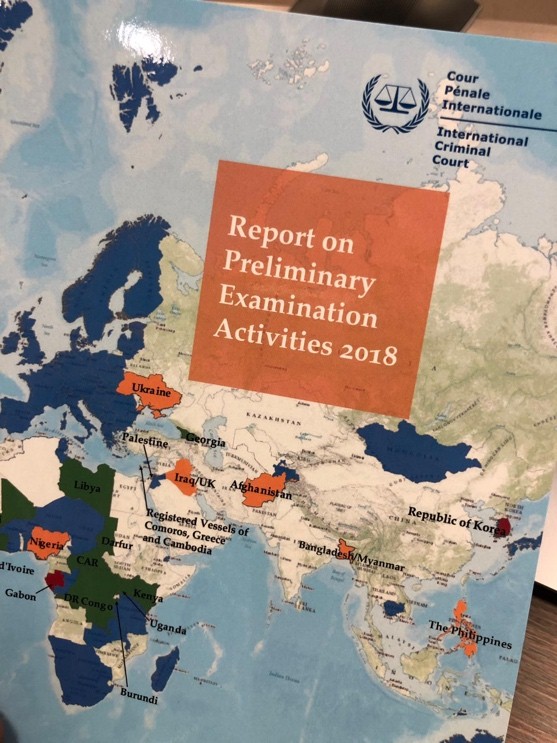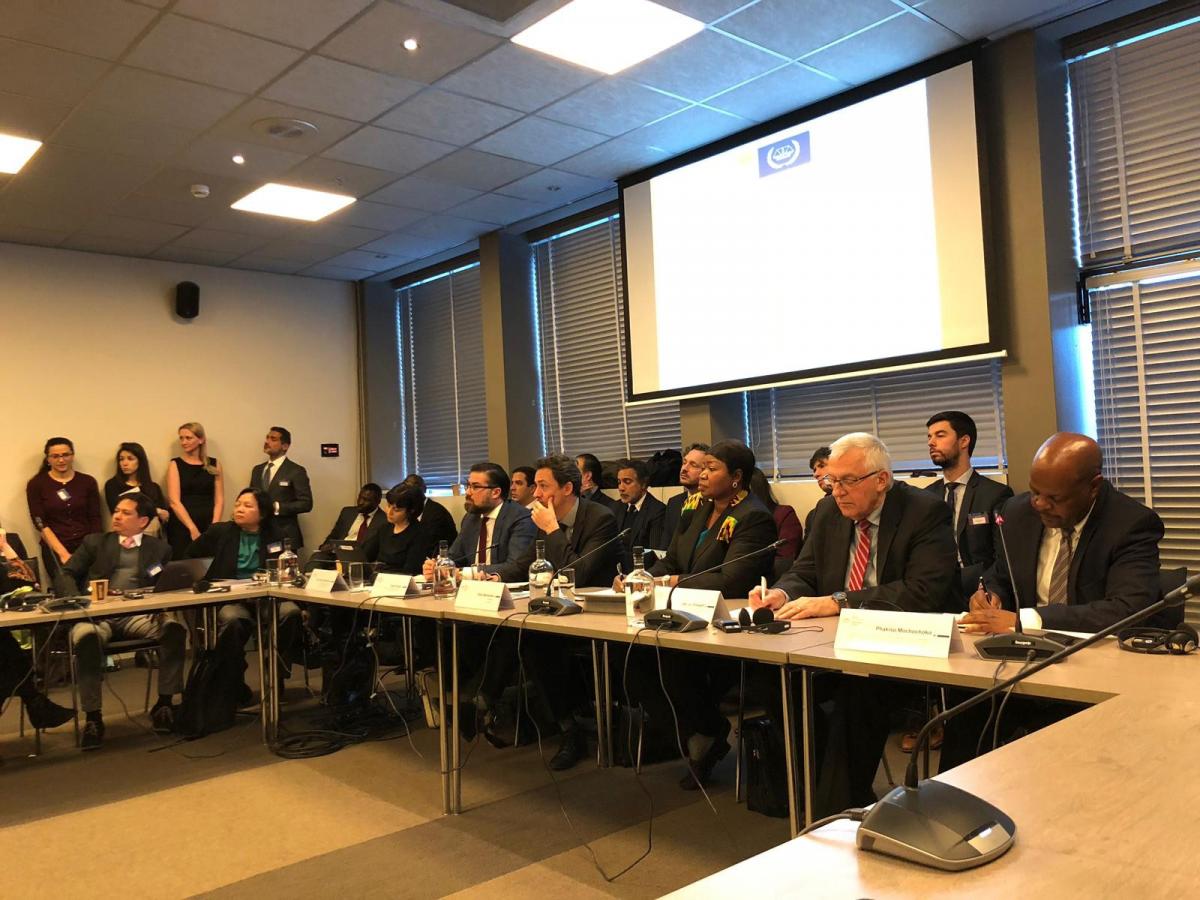Ariel Wheway
Ariel est une étudiante de quatrième année du programme bidiplômamt de Juris Doctor et de maîtrise ès arts en Affaires internationales de la Norman Paterson School of International Affairs de l’Université Carleton. Dans le cadre de ses études, elle s’intéresse au droit international des droits humains et au droit international pénal. Elle fait actuellement partie de l’équipe qui représentera l’Université d’Ottawa au concours de procès simulé ICC Moot et mène présentement des recherches pour le Rapporteur des Nations Unies sur le droit à un logement décent.
Symposium de Quid Justitiae à l’occasion de la 17e Assemblée des États Parties [ASP17 / AÉP17 (2018)]
Cette année encore, Quid Justitiae s’associe au Partenariat canadien pour la justice internationale à l’occasion de l’Assemblée des États Parties (AÉP) à la Cour pénale internationale, dont la 17e édition se déroule à La Haye, aux Pays-Bas, du 5 au 12 décembre 2018. Pendant cet événement, des représentant.e.s des États ayant ratifié le Statut de Rome ou y ayant accédé se rassemblent pour prendre des décisions cruciales concernant la Cour. De multiples événements parallèles sont aussi organisés par des organisations de la société civile pour stimuler les discussions et trouver des solutions aux problèmes qui entravent la réalisation du projet envisagé lors de l’adoption du Statut de Rome. Dans ce contexte, Quid Justitiae diffuse les billets écrits par les étudiant.e.s du Partenariat qui participent à l’AÉP. Ces billets résument, vulgarisent et analysent les événements qui surviennent à l’AÉP.
La onzième contribution à ce symposium est offerte par Ariel Wheway et concerne le plus récent rapport annuel du Bureau du Procureur.
Pour lire les précédentes publications du symposium, cliquez ici ou ici.

Photo credit: Marilynn Rubayika
On December 10, 2018 at the Assembly of States Parties to the International Criminal Court (ICC), Prosecutor Fatou Bensouda presented her “Report on Preliminary Activities 2018.” She was joined by Deputy Prosecutor James Stewart, as well as Emeric Rogier, Head of Situation Analysis and Information and Evidence Unit of the Office of the Prosecutor, Phakiso Mochochoko, Director of Jurisdiction, Cooperation and Complementarity Division of the Office of the Prosecutor, and Sam Sasan Shoamanesh, Chef de Cabinet to the Prosecutor. This panel generated a significant amount of attention, filling the room and spilling out into the hallway.
The session consisted of the Prosecutor making opening remarks, followed by questions for the panel from the audience. The Prosecutor’s opening remarks focused on the importance of preliminary examinations and provided an update on the status of the preliminary examinations that have been ongoing over the last year.
The Prosecutor stated that the purpose of preliminary examinations is primarily to determine whether or not there is a reasonable basis to conduct an investigation, but that they also serve a variety of other important functions: they set the stage for future investigations, and they encourage complementarity and cooperation with states. The Prosecutor stated that there have been situations, particularly Guinea and Colombia, where the Office of the Prosecutor (OTP)’s involvement in the situation played an important role in catalyzing accountability efforts at the national level. In Guinea, a national investigation was completed and concrete steps were taken to conclude national trials after the OTP became involved. In Colombia, the Special Jurisdiction for Peace is an important mechanism that was implemented and the ICC Prosecutor stated that the OTP will continue to support it, and will encourage the Attorney General to pursue cases under his jurisdiction. These examples illustrate the additional, important roles that preliminary examinations play, particularly with regard to encouraging domestic action.
The Prosecutor also addressed various criticisms that have been aimed at current preliminary examinations, particularly regarding the length of time that certain situations have taken. She referenced some of the factors that impact the amount of time a preliminary examination will take, including the complexity of the situation, states’ cooperation with the OTP, the budget and the OTP’s ever increasing workload. Preliminary examinations in places like Ukraine, Palestine and Nigeria, where the conflict involves several situations in one, for example, will take a longer time before a determination can be made. National mechanisms may also take time to deliver evidence and outcomes to the OTP. She also stated that preliminary examinations have a very small piece of the OTP’s budget, so limited resources impact efficiency. She stressed, however, that time spent on preliminary examinations is not wasted because the examinations set the stage for future investigations.
She then discussed the 10 preliminary examinations that are summarized in her report, some in greater detail than others: Gabon, Colombia, Guinea, Iraq/UK, Nigeria, Palestine, Bangladesh/Myanmar, Republic of the Philippines, Ukraine and Venezuela. Three examinations were initiated this year, while one – in Gabon – was concluded with a decision not to proceed with an investigation. She discussed the situation in the Philippines and stated that the OTP will continue conducting the preliminary examination into crimes allegedly committed since July 2016 in the context of the anti-drug campaign. She stated that despite the Philippines taking steps to withdraw from the Court, the Court still has jurisdiction over any Rome Statute crime until withdrawal, which includes thousands of extra-judicial killings. She then highlighted some of her Office’s successes, including that Venezuela was the first situation involving a multi-party referral to the OTP, and that her Office overcame the jurisdictional hurdle in the situation in Bangladesh/Myanmar.
She then stressed that Palestine and Ukraine are two situations that require urgent action because both are extremely complex in scope due to the variety of crimes alleged, including the involvement of armed conflict and occupation. She stated that these situations involve an unprecedented analysis of the conduct of hostilities, and she hopes to bring these preliminary examinations to an end soon.

Photo credit: Marilynn Rubayika
The Prosecutor also expressed concern about the prevalence of sexual and gender-based violence and, particularly, crimes against children. She stated that crimes against children have occurred in most, if not all, situations under preliminary examinations. The OTP continues to gather information on rape and sexual violence in Myanmar, sexual abuses of male and female detainees in Ukraine, sexual and gender-based violence in camps in Nigeria, the killing of teenagers in anti-drug operations in the Philippines, the destruction of educational facilities and kindergartens in Ukraine, and the killing of children in Gaza. The Prosecutor stressed that these occurrences are a stark reminder of the serious crimes that are considered by the ICC and reinforce the critical importance of preliminary examinations.
The question period brought some attention to how the OTP is addressing the threats made against the Court and its staff. This has been a source of great interest by many civil society representatives as well as some state delegates during other side-events, but was not substantially addressed in the Prosecutor’s opening remarks. The Prosecutor stated that her Office has been very clear that threats will not deter it from conducting its work, and that politics and pressures should form no part of the OTP’s decisions. She was pleased to see that states stood with and supported the Court in the face of recent threats, and encouraged states and civil society to continue this support.
With regard to the Court’s relationship with the African Union amidst states threatening to withdraw in the past, the Prosecutor stated that the situation has improved. She explained that the Court and her Office have made efforts to reach out to delegates of African states to explain some misperceptions of the Court and to make themselves available for questions. One misperception that she may have been referring to is that the ICC is targeting African states. She explained that her Office has organised workshops with the African Union, and that this engagement is better than having no dialogue.
Overall, this session gave the impression that the OTP is facing a great deal of challenges: from threats to the Office, to the difficulties inherent in both preliminary examinations and the specific situations under examination. Despite these challenges, Prosecutor Fatou Bensouda seemed resolute in her Office’s ability to face these challenges and continue its work to the best of its ability. It will be interesting to see the progress of the OTP over the next year, and if the Prosecutor remains just as resolute at next year’s ASP.

This blogpost and the Ariel’s attendance to the 17th Assembly of States Parties to the International Criminal Court are supported by the Canadian Partnership for International Justice and the Social Sciences and Humanities Research Council of Canada.


